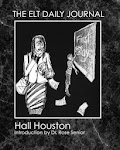Last year, I self-published my second book, Provoking Thought, through Booksurge (a company now known as Createspace), which has been an extremely positive experience.
Recently, I've been in touch with some ELT experts who have self-published their own works. In May and June, A Teacher in Taoyuan will feature several guest posts from these authors.
Although Alex Case and Lindsay Clandfield have written some brilliant pieces on getting published in ELT, I thought I would focus on self-publishing here.
What is self-publishing? Self-publishing is basically publishing a book on your own, without a publishing company. POD (print-on-demand) companies have made it very easy to put together a book. Companies such as Xlibris, Authorhouse, Lulu, iUniverse, and Createspace all offer a wide range of services and packages. You can decide which level of service you want. The most reasonable packages simply offer the book on their websites and add an ISBN number. If you are willing to pay more, you can get help with editing, proofreading, cover design, and marketing.
Briefly I'll list some of the pros and cons of self-publishing:
Some pros:
- you don't have to face constant rejection from publishing companies. Many publishers are unwilling to take on new projects from obscure authors, so sending out book proposals might seem like a waste of time.
- you have complete control over the content of your book. You don't have to compromise anything.
- you can get your book out quickly. While it can take long months, even years to get your book through the publishing process, your book can be self-published in a matter of weeks.
- you might find self-publishing perfect for your situation. For example, you might want to publish a number of books for a teacher training session or a seminar.
- you still have the rights to your book (although this may not be true with all POD companies). This can be ideal if a major publisher wants to re-publish your book.
- if you're lucky, you might profit off self-publishing (however, see cons #1 and #2 below)
Some cons:
- you have to pay for everything yourself. Not a problem if you're an expert at proofreading, formatting, cover design, sales, marketing... However, if you're paying others to do all these things, it can get expensive.
- you may never earn back your initial investment. Even if you've put together an ELTON-worthy classic, destined to revolutionize language teaching as we know it, there's no guarantee you will sell more than a few copies.
- there's less prestige for a self-published title. Therefore, it may be difficult to get your title reviewed or get your book on the shelves in libraries and bookstores.
If you'd like to learn more about self-publishing, these links should give you plenty to think about:
Wikipedia entry - Self-publishing
How Stuff Works - "How Self-Publishing Works"
CNET - Self-publishing a book: 25 things you need to know
In the next few weeks, I'll be handing the keyboard over to some ELT authors who will share their experiences with self-publishing. Stay tuned!
Subscribe to:
Post Comments (Atom)






4 comments:
Thanks Hall, I am looking forward to these posts, because I've often thought of self-publishing something in the future. I like your latest title a lot and am keen to find out your experience.
Your post was so helpful, thanks so much. I have many books on my computer, some are ready to be published, but I had not idea where to start. One question, how does the pricing work? From what I read, they set the price (probably according to demand) but how does that translate to the writer's share? Thanks again, Gilles
Thank you Lindsay and Gilles for your friendly comments.
Gilles, Booksurge (now Createspace) pays the author 35% of the list price each time a book is sold. However, the author's cut varies with the publisher. According to this article, Lulu pays 31%, while iUniverse pays only 20%.
Helpful post, useful info - I didn't know that Booksurge had merged, I suspect that Amazon wasn't making the profit they'd hoped from the unit.
Post a Comment